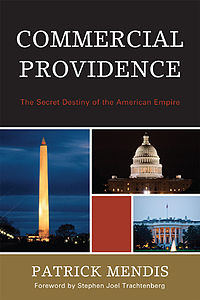- Commercial Providence
-
Commercial Providence: The Secret Destiny of the American Empire 
Author(s) Patrick Mendis Country United States Language English Genre(s) US foreign policy, US politics, Freemasonry, Global trade Publisher Rowman & Littlefield (USA) Publication date September 2010 Media type Print (hardcover), (softcover) Pages 318 ISBN 978-0-7618-5243-8 (hardcover), 978-0-7618-5244-5 (paperback) Preceded by Trade for Peace Commercial Providence: The Secret Destiny of the American Empire is a book written by Patrick Mendis in which he puts forward a new theory about the original conviction and commercial vision of the Founding Fathers of the United States.[1] The foreword to the book is written by Stephen Joel Trachtenberg, president emeritus of the George Washington University.[2]
Contents
Origin and Summary of the Theory
The author proposes a theory of Commercial Providence that links directly to the Founding Fathers (especially George Washington and Benjamin Franklin) who collectively held an ancient belief that America’s Special Providence was associated with a more secular idea of God, i.e., what they called “Nature’s God.” At the birth of the United States, the Founders maintained “God [Providence] had favored their undertakings,” or Annuit Coeptis, as shown on the Great Seal of the United States. These founding architects were building a monument to “Nature’s God” as they understood it when they designed the nation’s capital to correspond with three stars that form a celestial triangle in the sky above Washington, D.C. The author states that within this triangle lies the Virgo constellation, which had a great deal of symbolic importance to Masonic leaders like Washington, Franklin, Paul Revere, and others who had intimate knowledge of Freemasonry and symbolism.[3]
As in astrology and Wisdom traditions, the author describes that Virgo is ruled by Mercury, the Roman god of commerce, innovation and communication. He then documents that the founding architects of the nation's capital expressed this esotoric notion in symbolism that America would also be led by commerce. Dr. Mendis argues that not only did the city planners incorporated this astrological and esoteric knowledge into the architectural design of Washington, but they also embedded this founding ideology into the U.S. Constitution and its Commerce Clause by designing our "global nation" to be a “Commercial Republic” in which the Union was joined together through trade and commerce—not religion, as is frequently debated today.
The American Project Born of Freemasonry
Mendis notes that the 2009 historic scene at the joint-session of Congress—where mixed race President Barack Obama flanked working class Vice President Joe Biden and female Speaker Nancy Pelosi—can also be seen as a dramatic testament to the “ancient hope” manifested through Commercial Providence and E Pluribus Unum, “out of many, one.”[4] In his theory, Dr. Mendis, an affiliate professor of public and international affairs at George Mason University, connects all of these seemingly lesser-known historical facts and present-day evidence to explain America’s evolving role in the world—from the voice of dissent to a powerful force for the export of American idealism through commerce with foreign nations. Professor Mendis summarizes the book with a quote from Alexis de Tocqueville in his Democracy in America (1835): “Providence has given us a torch which our forefathers did not possess, and has allowed us to discern fundamental causes in the history of the world which the obscurity of the past concealed from them.”[5] To that end, the theory of Commercial Providence is a masterful deciphering of the founding ideas and ideals shared by the Freemasons and their notion of Universal Brotherhood and symbolism, which has indelibly marked both the capital architecture and national governance.[6]
In a book review for Academic Librarians in the CHOICE magazine, Professor W. C. Johnson at Bethel University writes:
The US was destined and guided by a benevolent Providence to be a commercial rather than religious nation, a 'philosophic empire' that would peacefully dominate the world, argues Mendis (George Mason Univ.). Its founding was rooted in the Freemason vision of a unitary God, the great architect of the universe. The Masonic origins of the nation's symbols and of the location and design of Washington, DC, are extensively documented here....It is a thorough exposition of this popularly held viewpoint."[7]Empire of Liberty
The book essentially decodes the secret architecture of our nation’s capital masterminded by the first president of the United States, and recognizes Washington, D.C. as a “Masonic City” in which Egyptian and Greco-Roman symbols were used to signify America’s global mission.[8] There are no icons that sanctify Christianity—a glaring omission that has certainly led to a heyday for conspiracy theorists and Christian fundamentalists. Mendis explains the attraction of commerce over religion, and uncovers the “public secret” of Freemasonry in achieving Thomas Jefferson’s "Empire of Liberty" through Alexander Hamilton’s global strategy of trade, commerce and finance.[9] Like Charles Darwin’s theory of evolution, the theory of Commercial Providence is an evidence-based exposition of historical and present-day symbolism that points to America’s secret destiny—and its exceptionalism—as the founder of a global Empire of Liberty.
References
- ^ http://www.univpress.com/isbn/0761852433
- ^ http://aapress.com/education/american-professor-patrick-mendis-is-on-asian-book-tour/
- ^ http://commercialprovidence.blogspot.com/
- ^ http://www.sarvodayausa.org/story/sarvodaya-usa-advisor-reveals-americas-destiny-in-a-new-book/
- ^ http://www.gutenberg.org/files/815/815-h/815-h.htm
- ^ http://www.dailynews.lk/2010/09/16/fea27.asp
- ^ http://www.cro2.org/default.aspx?page=reviewdisplay&pid=3634154
- ^ http://www.3rdheaven.org/?attachment_id=281
- ^ http://www.amazon.com/gp/product/0761852433/ref=kinw_rke_rti_1
Categories:- History books about the United States
- Freemasonry
- 2010 books
Wikimedia Foundation. 2010.
